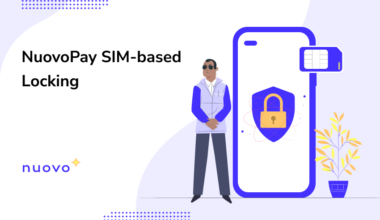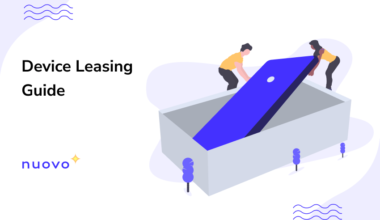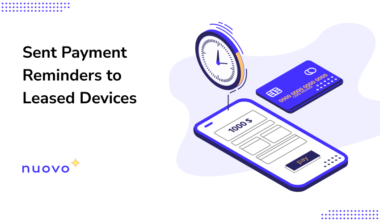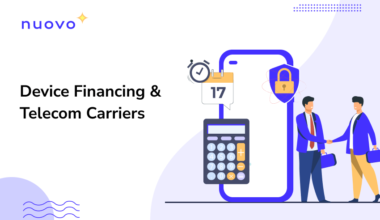There is always a sub-conscious dilemma for consumers: Device Leasing vs Buying? – what’s the right choice for them? The decision to this question varies in diverse use cases and has no single answer to stick to.
However, when we think about the consumers who just want to use a gadget that might have long years of usage and replacement, then buying is a great option. But, if there are consumer segments who intend to live a technologically up-to-date lifestyle, then they might wish to upgrade their existing asset to the latest ones in the market, and investing a huge amount of money in a smaller gap of time would be a costly decision.

So, if this dilemma has occurred to your mind – what’s the right choice for you as a consumer when it comes to – Device Leasing vs Buying? then you are at the right place.
Let’s explore what could be the right choice for consumers and how the concept of Device Leasing vs. Buying can impact the decision-making ability for you as one of them.
How to determine what is best for you?
As per statistics, in the US, 80% of companies prefer to lease their technological gadgets for business operations¹. The same trend goes for the end-consumers as well who wish to keep themselves technologically upgraded.
However, there may be pros and cons that might come attached as per your use case. For instance, to get a device on a lease, there will be financial background status check-up factors that will determine your credit loan sanctioning ability. On the other hand, if you might just want to buy the asset, there won’t be such strict norms as you pay upfront and acquire the gadget.
To determine what is best for you, you need to first understand the benefits of both the factors and reconcile them with your flexibility and customization needs along with the period of usage. Along with that, you need to also determine if you have steady cash flow in hand or will the EMI options be flexible to you now for decision-making.
Let’s understand in depth what is the primary difference between device leasing vs buying when it comes to technological gadgets so that the variables can open streams of thoughts for you to make a quicker decision.
When you buy a gadget, you become the sole owner of the same until you sell it to someone else or have disposed of it due to any reason whatsoever. However, when it comes to leasing, you can pay a predetermined sum of money upfront (as per the agreement) and convert the remaining amount into EMI to get the device to the life of the lease period.
However, if you wish to, you can either purchase the asset as soon as the lease period is over or you might return the same and upgrade to the latest model with some additional paperwork and upfront cash flow.
Learn More: Democratizing Technology with Smartphone FinancingNow, after analyzing your need and available options, you can opt for either device leasing vs buying as per your use case.
Is leasing the better option for you?
Cost can be an important factor in either of the cases of device leasing vs buying but the allocation of the same cost determines the investment ability and decision making. Let’s explore a few factors and self-assessment questions that can help you understand why device leasing can be a more reliable option than buying a device.
1. Whats expensive – Device Leasing vs Buying?
Most of the consumers perceive an assumption that leasing is a long-term commitment for a single gadget and the investment can ladder more than what is estimated if brought upfront in Buying. The fear of an additional rate of interest and cumulative hidden additional tricks drain the minds of stress and the consumers end up investing a huge pile of money for acquisition by buying the devices.
However, it is to be understood that the perception based on the device leasing model has been summed up through generalizations of thoughts and false rumors by the end-customers who might have faced decisiveness in their lease agreements or on their assumptions because they didn’t spend enough time to understand the standard procedure and put their sign on the agreement.
It is to be understood that leasing does have an additional payment scheme over and above the buying price, but these are due to several factors that result in bringing you flexibility. With options like tech up-gradation, services, and maintenance or offers to buy the device after the lease period or end the lease at your convenience can significantly occur to you as a great deal more than investing your money at once to acquire the same asset in terms of ownership and usage.
2. Want greater flexibility and easy upgrades?
Technology is evolving at a much faster pace than a technological device hitting the shelf and becoming a must-have one to the very moment of another device hitting the shelf with better upgrades than the previous one. These upgrades come with a cost, a cost of replacing a reliant device that is now more obsolete technically than the newer version that conquered the market.
However, it does depend on the use cases of end-consumers but the dilemma of constantly needing to upgrade your device someday still stays at the top of the game. It lands you into a potentially expensive position and makes you question that if these devices are anyway going to be obsolete for me in a few months, why invest a pile in it?
This is where the flexibility of leasing comes. When you enter into a lease agreement, you acquire an asset, but you also get an option to upgrade your possession to the latest version as per your agreement. Not only this, with the latest asset refreshment and up-gradation at a reasonable investment, you can stay aligned with the technology conquering the market as well as not worry about the previous device as you hand it back to the lessor in return.
3. Be the user yet flexible owner
When you purchase a technological asset, the entire ownership of the product is transferred to you. That may sound ethical and beneficial but, if you become the owner, you assess the entire responsibility of the digital asset at your hand.
Also, during the instance when the technology you require no longer supports your device with the indicator signal to upgrade, be it ethical or legal disposal after the purpose of buying the product and the usage is fulfilled, Buying might re-question your decision again.
You might also not get a quick option to re-sell your asset since it will also withstand several factors such as how long can the device take to find a potential buyer? How much depreciation will I have to suffer and even after depreciation, will this device still carry any value? Is there someone who would really need this device and what can be the best and quick channel to sell?
Instead of going for entire ownership, you can yet become a flexible owner of the devices till the period of a lease agreement if you turn to options other than buying. You will be the user as well as the owner of the equipment till the lease period and later return it or upgrade it with the latest device as per the flexibility of agreement with your lessor.
Not only this, with lease, you can avail the luxury of time till the agreement if you intend to claim the entire ownership after the end of the agreement period or shall you upgrade to something better. You derive the entire benefits and save yourself from the hassle of unanswered questions of “what if” if you were in the trap of buying rather than leasing.
Retrospection checklist before you invest next
Now that you know what weight can lease add in terms of flexibility and usage dependency, Buying too maybe not be a non-stable option if you are not looking for an instant upgrade as soon as new technology hits the shelves. After reading till now and understanding the entire scenario of Device Leasing vs Buying, there is yet one checklist that you should run your eyes through so that the decision you make might not become a regrettable one.
When you sit to decide on the possession of a new device, ask yourself:
- Do you have upfront cash ready to invest and buy the device in case of Buying?
- If not, what is the affordable amount you can pay each month if entered into a lease agreement?
- Are you looking for a device to hold for the long term or upgrade as new technology hits the shelves?
- Is it mandatory for you to gain ownership of the device?
As soon as you gain all the answers, you might still feel that leasing can be the feasible option due to its goldmine of potential cost, hassle, and time savings.
Closing lines…
These few simple rules of thumb and analysis can help to understand and analyze which option is best in your use case – Device Leasing vs Buying. However, if you are tech-savvy and intend to upgrade your device as soon as it enters the market, leasing will help you to yield financial benefits and an opportunity to not stay saddled with a piece of outdated equipment for long.
If you are worried about financing options specializing in the equipment of leasing, you can rely on NuovoPay. Any OEMs or telecom manufacturer or technological device reseller can streamline the intricate process of phone leasing and requisition. With NuovoPay, simplified leasing procedures and onboarding with straightforward payments can be a forthright appreciation for partners.






